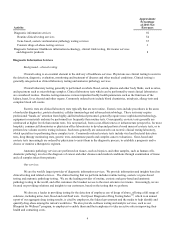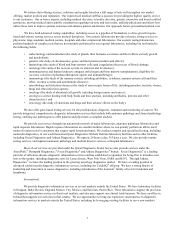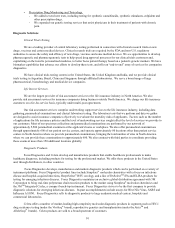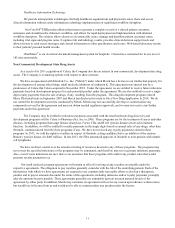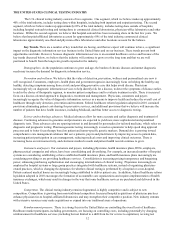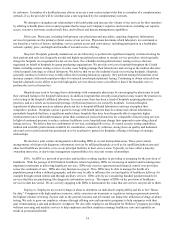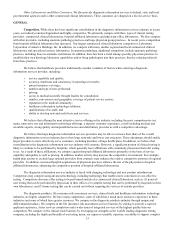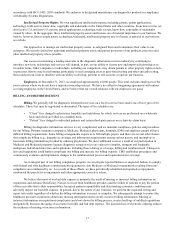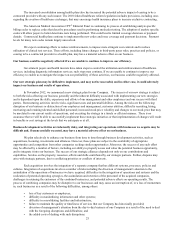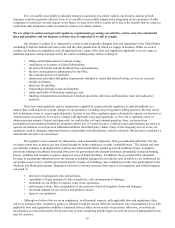Quest Diagnostics 2013 Annual Report Download - page 20
Download and view the complete annual report
Please find page 20 of the 2013 Quest Diagnostics annual report below. You can navigate through the pages in the report by either clicking on the pages listed below, or by using the keyword search tool below to find specific information within the annual report.16
global clinical trials and our lab management and information technology solutions. We compete in the healthcare information
technology industry by offering solutions that foster better patient care and improve performance for healthcare institutions,
patients and physician practices, particularly smaller and medium sized physician practices.
Sales and Marketing. Our Diagnostic Information Services business has a unified commercial organization focused
on the sale and downstream marketing of most of our services. It coordinates closely with our clinical franchise organizations,
which are responsible for upstream marketing. The commercial organization is centrally led, and is organized regionally, in
conjunction with our operations organization, to ensure aligned delivery for our customers. The commercial organization also
is organized to support our clinical franchise organizations. We maintain a separate sales and marketing organization for our
employer drugs-of-abuse testing business.
In Diagnostic Solutions, we maintain sales forces devoted to each of our businesses. We have sales organizations that
focus on selling diagnostic products and our healthcare information technology solutions. We also have dedicated sales teams
that focus on selling risk assessment services in the life insurance industry and clinical trials services.
Information Technology. We use information systems extensively in virtually all aspects of our business, including
clinical testing, test reporting, billing, customer service, logistics and management of medical data. We endeavor to establish
systems that create value and efficiencies for our Company and customers. The successful delivery of our services depends, in
part, on the continued and uninterrupted performance of our information technology systems. We have taken precautionary
measures to prevent problems that could affect our information technology systems.
Some of our historic growth has come through acquisitions and, as a result, we continue to use multiple information
systems. We have implemented some common systems, and are planning to implement more common laboratory information
and billing systems across our operations, to standardize our processes. We expect implementation will take several more years
to complete, and will result in significantly more centralized systems, improved operating efficiency, more timely and
comprehensive information for management and enhanced control over our operational environment.
Quality Assurance. In our diagnostic information services business, our goal is to continually improve the processes
for collection, handling, storage and transportation of patient specimens, as well as the precision and accuracy of analysis and
result reporting. Our quality assurance efforts focus on pre-analytic, analytic and post-analytic processes, including positive
patient identification of specimens, report accuracy, proficiency testing, reference range relevance, process audits, statistical
process control and personnel training for all of our laboratories and patient service centers. We also focus on the licensing,
credentialing, training and competence of our professional and technical staff. We have implemented a specimen tracking
system with global positioning system capabilities that enables us to better track specimens. To help achieve our goal of
becoming recognized as the undisputed quality leader in the diagnostics information services industry, we continue to
implement initiatives to enhance our quality and standardization, using our best-in-class business performance tools. In
addition, some of our laboratories have achieved International Organization for Standardization, or ISO, certification for their
quality management systems.
As part of our comprehensive quality assurance program, we utilize internal proficiency testing, extensive quality
control and rigorous process audits for our diagnostic information services. For most clinical laboratory tests, quality control
samples are processed in parallel with the analysis of patient specimens. The results of tests on these quality control samples
are monitored to identify trends, biases or imprecision in our analytical processes.
We participate in external proficiency testing and have accreditation or licenses for our clinical laboratory operations
from various regulatory agencies or accrediting organizations, such as the Centers for Medicare and Medicaid Services
(“CMS”), the College of American Pathologists (“CAP”) and certain states. All of our laboratories participate in various
external quality surveillance programs. They include, but are not limited to, proficiency testing programs administered by CAP,
as well as some state agencies. CAP is an independent, nongovernmental organization of board-certified pathologists approved
by CMS to inspect clinical laboratories to determine compliance with the standards required by the Clinical Laboratory
Improvement Act ("CLIA"). CAP offers an accreditation program to which clinical laboratories may voluntarily subscribe. All
of our major regional and esoteric laboratories, including our facility in India, and most of our rapid response laboratories, are
accredited by CAP. Accreditation includes on-site inspections and participation in the CAP (or equivalent) proficiency testing
program. Also, all of our cytotechnologists and pathologists participate in an individual proficiency testing program.
Our diagnostic products businesses maintain extensive quality assurance programs focused on ensuring that our
products are safe and effective and that we comply with applicable regulatory requirements in the United States and other
countries. They are regulated by the FDA and are required to be in compliance with the Quality Systems Regulations, 21 CFR
part 820, and with applicable standards outside the United States. In addition, our manufacturing sites are certified in


